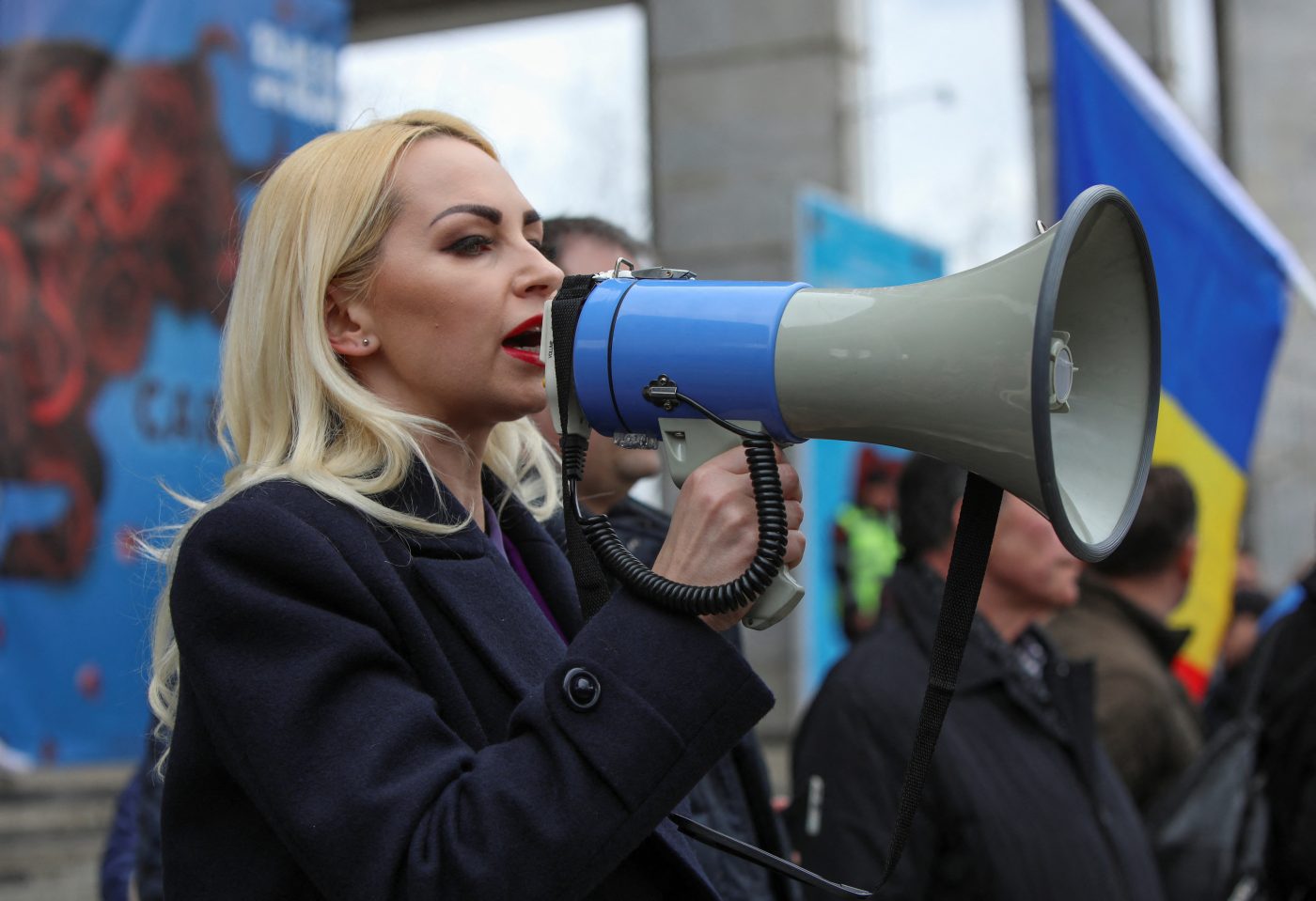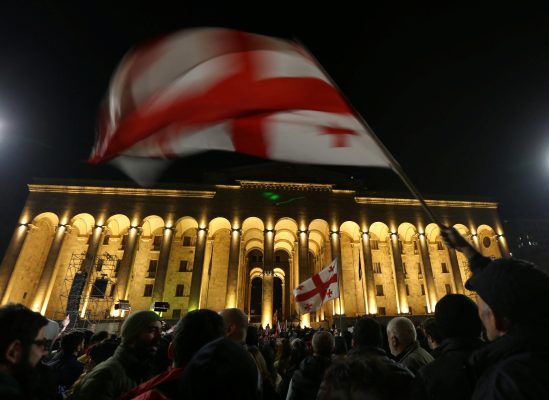Moldova is engaged in a shadow war with the Kremlin amid concerns that Russia is trying to topple the democratically elected government of the small but geographically key republic wedged between Romania and Ukraine.
The Moldovan government says it has evidence that Russia is seeking to replace it with a pro-Russian regime and to exploit Moldova to facilitate its war in Ukraine. The country has gone so far as to ban Serbian soccer fans and Montenegrin boxers at the border, fearing they may be saboteurs sent by Russia to overthrow its government.
Ukrainian President Volodymyr Zelenskyy exposed what he said was a Russian threat to Moldova on February 9. In a speech to the European Council in Brussels, Zelenskyy said he had informed Moldovan President Maia Sandu of Russia’s plans to “break the democratic order” of Moldova and “establish their control over it.” The following day, Moldovan authorities confirmed receipt of these details from Ukrainian intelligence. And on February 13, Sandu said: “The purpose of these actions is to overturn the constitutional order, to change the legitimate power from Chisinau to an illegitimate one that would put our country at Russia’s disposal to stop the European integration process, but also so that Moldova can be used by Russia in its war against Ukraine.” She said Moldova was on high alert in response to the Russian threat.
A few days before Sandu’s remarks, Moldovan Prime Minister Natalia Gavrilita abruptly resigned citing “many crises caused by Russian aggression in Ukraine.”
The country has long been in Russia’s crosshairs. On February 21, Vladimir Putin revoked a 2021 decree that in part underpinned Moldova’s sovereignty in resolving the status of its breakaway, pro-Russian Transnistria region, where Russian troops are illegally based.
Changing the geopolitical status quo in favor of Russia would weaken the common front against Russian aggression. At worst, a pro-Russian Moldova could force Ukraine to increase the defenses of its western border at a time when troops are badly needed elsewhere.
Several aspects of the Russian threat to Moldova, outlined by Sandu, should be highlighted. First, Russia would allegedly seek to destabilize Moldova through violent protests organized by pro-Russian forces. Second, paramilitary groups from Russia and other countries (Belarus, Serbia, and Montenegro) would travel to Moldova and engage in violent acts against state institutions, including hostage-taking operations. Third, Moldovan security services had uncovered similar threats in 2022, but all of them were quashed. Fourth, protests could be used as the main vehicle to force a change of power and constitutional order. Sandu underlined that Moldovan authorities have the situation under control.
She wrote in a Facebook post on February 22 that she had invited US President Joe Biden to visit Moldova, which, like Ukraine, seeks to join the European Union (EU.) The two leaders met in Warsaw, where Biden “reaffirmed strong US support for Moldova’s sovereignty and territorial integrity,” the White House said in a statement. Russian, meanwhile, alleged without evidence on February 23, that Ukrainian saboteurs dressed as Russian servicemen would launch attacks in Transnistria.
Since the pro-EU Action and Solidarity Party (PAS) took office in Moldova in August 2021, the pro-Russian opposition has organized anti-government protests mainly by exploiting public discontent with the socioeconomic situation in the country. The energy crisis that hit Moldova at the end of 2021 has continued ever since as a result of Russian supply disruptions and has played a crucial role in worsening the living conditions of the poorest.
Socially vulnerable groups are the backbone of anti-government protests. They are often paid to participate in protests and know very little about the forces orchestrating such actions, most importantly those investigated for corruption and sanctioned abroad for enabling Russia’s malign influence in Moldova.
For example, in June 2017, a Moldovan court sentenced businessman Ilan Șor to seven and a half years in prison on charges relating to a $300m fraud, part of a larger scam that defrauded three of Moldova’s largest banks of some $1bn. Șor, now a Moldovan lawmaker who leads the Șor Party and holds six of the 101 seats in Moldova’s parliament, reportedly now lives as a fugitive in Israel.
His party organized a big anti-government rally earlier in February. Șor was the subject of US sanctions in 2022 for working with Russia to subvert Moldovan elections. One senior Russian politician praised Șor as a “worthy long-term partner.” Șor Party representatives in the legislature have on several occasions been investigated for illegal financing of the party, others have been arrested and documents have emerged detailing extensive links between it and Russia’s FSB. Șor has denied these allegations.
The Moldovan government has recommended a number of measures to counter the alleged Russian threat. First, Moldovan authorities will speed up legislative changes by giving more powers to the intelligence service and prosecutors. Participation in actions deemed favorable to Russia and that threaten national security will be offenses, according to changes in the Criminal Code in February 2023. Exponents of pro-Russian forces will be the first target.
There are concerns that efforts to strengthen the powers of law enforcement agencies lack strong checks and balances, which could lead to abuses. Earlier in February, for example, Moldovan border police prevented the entry of Serbian football fans and Montenegrin boxers after Sandu warned saboteurs from the two countries could be part of an alleged Russian coup plot. None of the barred individuals appeared to have a criminal record.
On February 19, the Șor Party organized an anti-government rally of several thousand participants in the Moldovan capital Chisinau. Police filed around 50 cases against the rally’s participants relating to minor offenses. So far, no weapons or explosives linked to alleged Russian subversive actions have been discovered. The pro-Russian opposition argues that the ruling PAS is using a supposed Russian threat to shore up the security focus of the new government, headed by Prime Minister Dorin Recean, a former security adviser to Sandu.
But after a difficult 2022, when Moldova’s security was shaken by a series of regional and national crises, the country appears more resilient in 2023. The Russian military’s plans to reach Moldova by occupying Odesa failed last year, meaning Russian main forces are still a long way from the country’s eastern frontier.
While the Kremlin can raise the pressure by firing missiles aimed at Ukraine through Moldovan airspace (as it has already done) and weaponize poverty and corruption through sympathetic forces inside the country, the government has gained institutional memory and has developed policies to counter these tactics.
While Russian-coordinated subversion cannot be ruled out, Moldovan authorities must also be vigilant about the risks emanating from Transnistria and Gagauzia, an autonomous territorial unit of Moldova, from where provocateurs, with or without military training, can easily travel by land to Chisinau. The most potent threats to Moldova that Russia can most quickly activate come from within.
Denis Cenusa is an Associate expert at Eastern European Studies Centre (Lithuania) and the Independent Economic think tank “Expert-Group”(Moldova.)
Europe’s Edge is CEPA’s online journal covering critical topics on the foreign policy docket across Europe and North America. All opinions are those of the author and do not necessarily represent the position or views of the institutions they represent or the Center for European Policy Analysis.





